Introduction from NCPS Chief Executive, Jyles Robillard-Day
Welcome to the first NCPS public affairs newsletter of 2025. As we begin this new year, I am pleased to reflect on our recent advocacy efforts and share our ambitions for the months ahead. NCPS remains steadfast in championing the counselling and psychotherapy profession, ensuring our members' voices are heard within the evolving political and healthcare landscape.
Since our last newsletter in July 2024, with the Labour Government now firmly in place, NCPS has intensified advocacy efforts, engaging with key decision-makers to ensure our members’ contributions to mental health care are recognised.
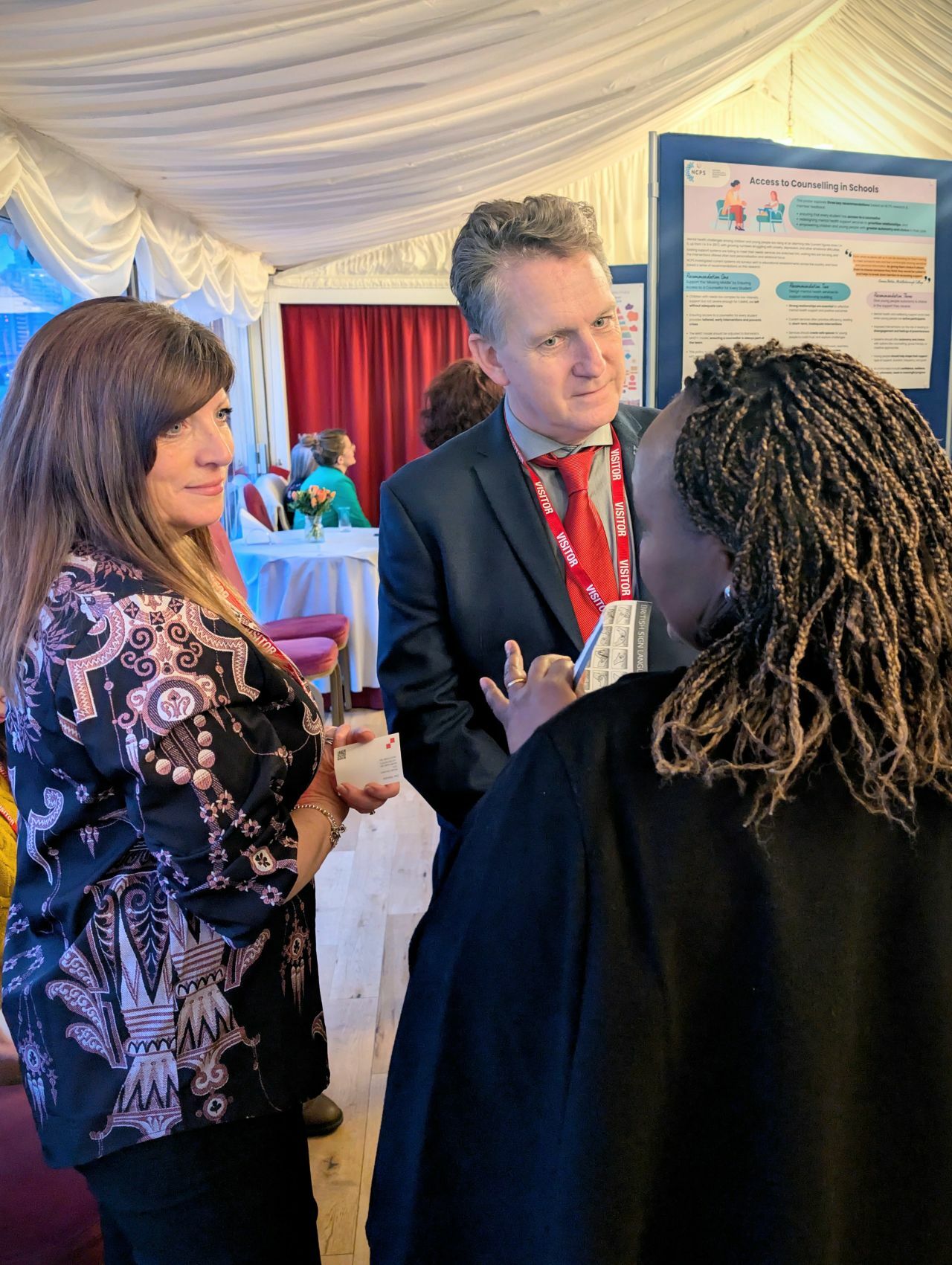
Labour inherited an NHS in crisis, with Lord Darzi’s rapid review describing the service as in ‘critical condition’—beset by long waiting times, under-resourced primary care, and unmet public expectations. Prime Minister Keir Starmer set out a stark warning that the NHS must ‘reform or die,’ with a new 10-year plan in development, promising a shift from analogue to digital, hospital to community, and sickness to prevention. NCPS welcomes this focus on prevention and is working to ensure that counselling and psychotherapy are central to these reforms.
Over the past months, NCPS has played an important role in supporting the Government’s work, drawing on the widespread experience of our membership and robust evidence base to contribute to key inquiries, including the Darzi Review, the NHS 10-Year Plan inquiry, and the Government’s Spending Review, highlighting the role of accredited counsellors and psychotherapists in reducing waiting times, delivering accessible mental health services, and supporting preventative care. As the Government grapples with fiscal constraints, we continue to emphasise the cost-effectiveness and necessity of integrating counselling into the NHS.
Alongside this, the NCPS has been busy meeting with our key stakeholders. Two standout moments for NCPS have been our presence at the Labour Party Conference and our parliamentary drop-in session. At the Labour Party Conference, our stand was a hub for engaging with key stakeholders, including Secretary of State for Health Wes Streeting, who expressed strong interest in the role our members can play in alleviating pressures on the NHS. The parliamentary drop-in allowed us to showcase data and insights that underscore the value of counselling and psychotherapy, reinforcing our position as a leading voice in mental health advocacy.
As we move forward into 2025, NCPS is committed to securing direct access to counselling, advocating for sustained investment in preventative mental health services, and ensuring our members are integral to the NHS workforce and policy landscape. I am proud of what we have achieved and look forward to working with our members to drive meaningful change in mental health care.
Jyles Robillard-Day, Chief Executive
Policy and Political Overview
Since the General Election in July 2024, the past few months have provided an early glimpse into the new Government’s direction on mental health policy amidst significant challenges and demands for reform. Elected with high expectations and an ambitious mandate for change, the Government faced the daunting task of delivering on its promises.
The Darzi Review, commissioned at the outset of the Government’s tenure to assess the healthcare system after 14 years of Conservative rule, exposed an NHS mental health system struggling with soaring demand. Opening a call-for-evidence over the summer, to which NCPS submitted, and published in September, the review underscored the urgent need for systemic reform to expand mental health capacity and improve access through community-based care and multidisciplinary models integrating primary, community, and mental health services.
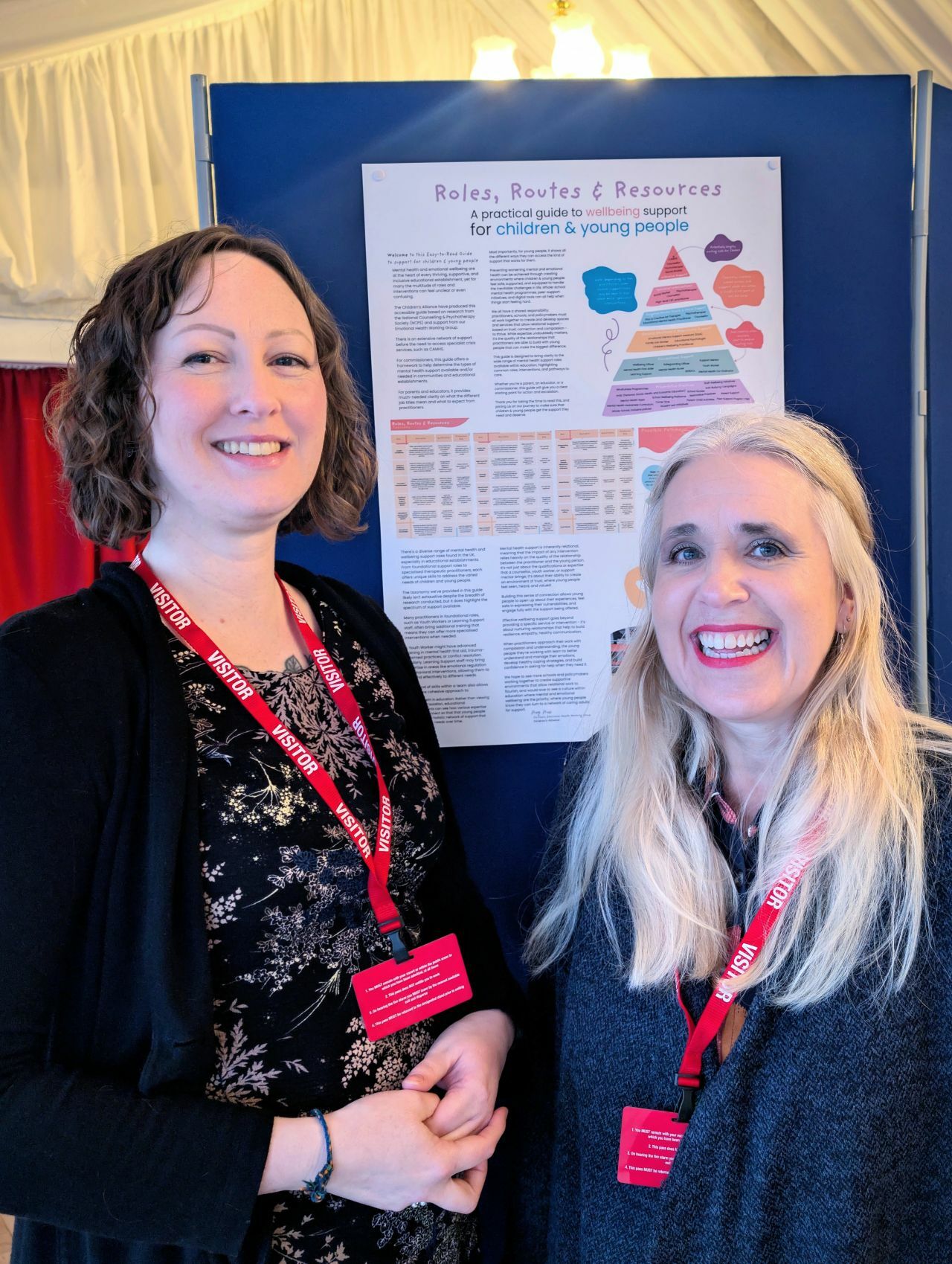
Rachel Reeves’ first Budget in October marked Phase 1 of the Spending Review, setting departmental budgets for 2024-25 and 2025-26, with mixed reviews. It included £22.6 billion for health, focusing on elective care backlogs and mental health services. While £26 million was ring-fenced for mental health crisis centres, concerns about insufficient funding for early intervention and preventative mental health services remain. NCPS has submitted evidence to Phase 2 of the Spending Review, expected in late spring, advocating for integrating accredited counsellors and psychotherapists into NHS pathways to reduce waiting times and provide timely support.
Meanwhile in Parliament, the Mental Health Bill is progressing through legislative stages, aiming to modernise the Mental Health Act by enhancing patient rights, reducing unnecessary detentions, and tackling racial disparities in mental health care. The Children’s Wellbeing and Schools Bill is also currently making its way through Parliament. NCPS has submitted written evidence to the Bill’s committee, welcoming its focus on children’s wellbeing but highlighting a significant omission: the lack of a national commitment to school-based counselling. NCPS emphasised that counselling in schools is vital for early intervention, particularly given the growing mental health needs of young people. This submission reflected a broader concern that, without robust mental health support in schools, the Bill’s ambition to improve children’s wellbeing might fall short.
The government's Get Britain Working White Paper (November 2024) set out a new approach to employment support, including expanding NHS Talking Therapies, increasing Individual Placement and Support (IPS) services, and recruiting 8,500 new mental health staff. NCPS welcomed these steps but emphasised that genuine reform must prioritise access to therapy and prevention-focused interventions to ensure individuals receive support before returning to work.
In January 2025, the Road to Recovery: Government's 2025 Mandate to NHS England outlined plans to reform elective care, reduce waiting times, improve primary and community-based care, and prioritise prevention. NCPS highlighted the lack of equivalent urgency for mental health waiting lists and emphasised the need for parity between mental and physical health, cautioning against over-reliance on digital solutions at the expense of face-to-face therapy.
Labour Party Conference 2024
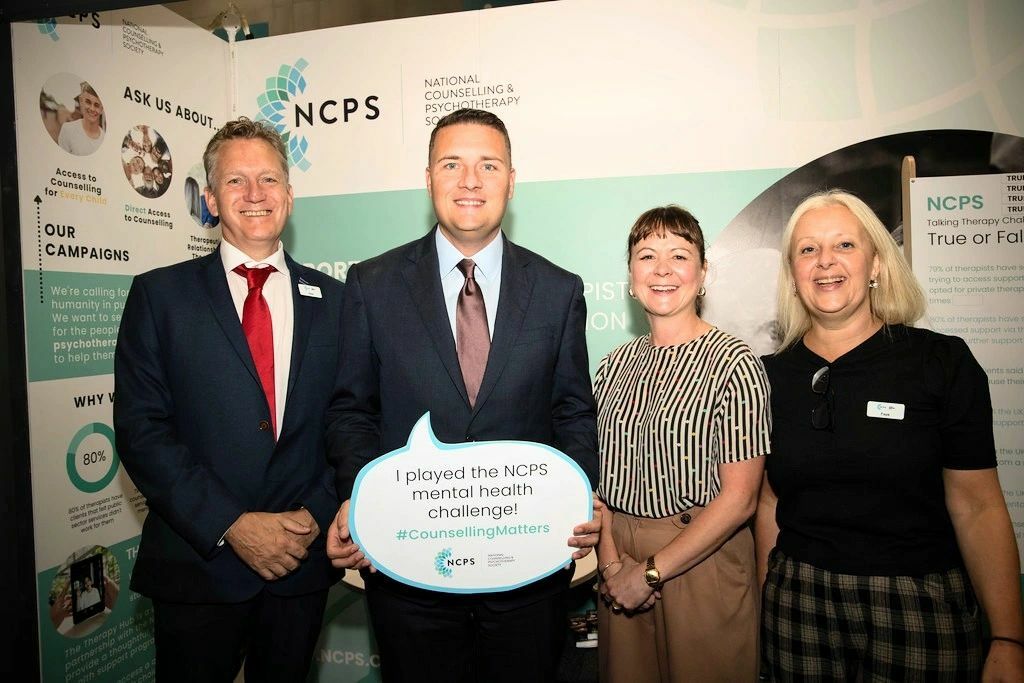
Following its tradition of maintaining a strong presence at Labour Party Conference, NCPS attended again this year with a stand in the exhibition hall. This year saw our most prominent visitors yet, engaging directly with key Labour figures at a critical time in their new Government to emphasise the vital contributions of counselling and psychotherapy to mental health service delivery.
Wes Streeting MP, Secretary of State for Health and Social Care, visited our stand and reaffirmed Labour’s commitment to expanding mental health access, including utilising private sector capacity at no cost to patients—a point resonating with our long-standing push for Direct Access to Counselling. Staying to play our game on current mental health provision—and getting all the answers right!—the conversation felt like the start of something tangible.
Karin Smyth MP, Minister of State at the Department of Health & Social Care, brought a practical lens, asking insightful questions about integrating counsellors into NHS services, leaving us hopeful about future collaborations.

With 243 new Labour MPs, we connected with many fresh faces, including Josh Dean MP (Hertford and Stortford), whose enthusiasm for mental health support was clear. We also reconnected with trusted allies like Abena Oppong-Asare MP, underscoring the importance of strong relationships with MPs. Overall, Labour Party Conference 2024 was positive, setting up strong engagement opportunities with the new Government.
Further Political Stakeholder Meetings and Engagement
NCPS made significant strides with its political engagement this winter, highlighted by a well-attended parliamentary drop-in event.
In early December, NCPS booked a room in Portcullis House, inviting MPs and peers to discuss the vital role of counselling and psychotherapy in tackling the UK’s mental health challenges. Sharing constituency-specific data on waiting times and the availability of NCPS-accredited counsellors, the Society offered a clear snapshot of the current landscape—and opportunities for improvement.
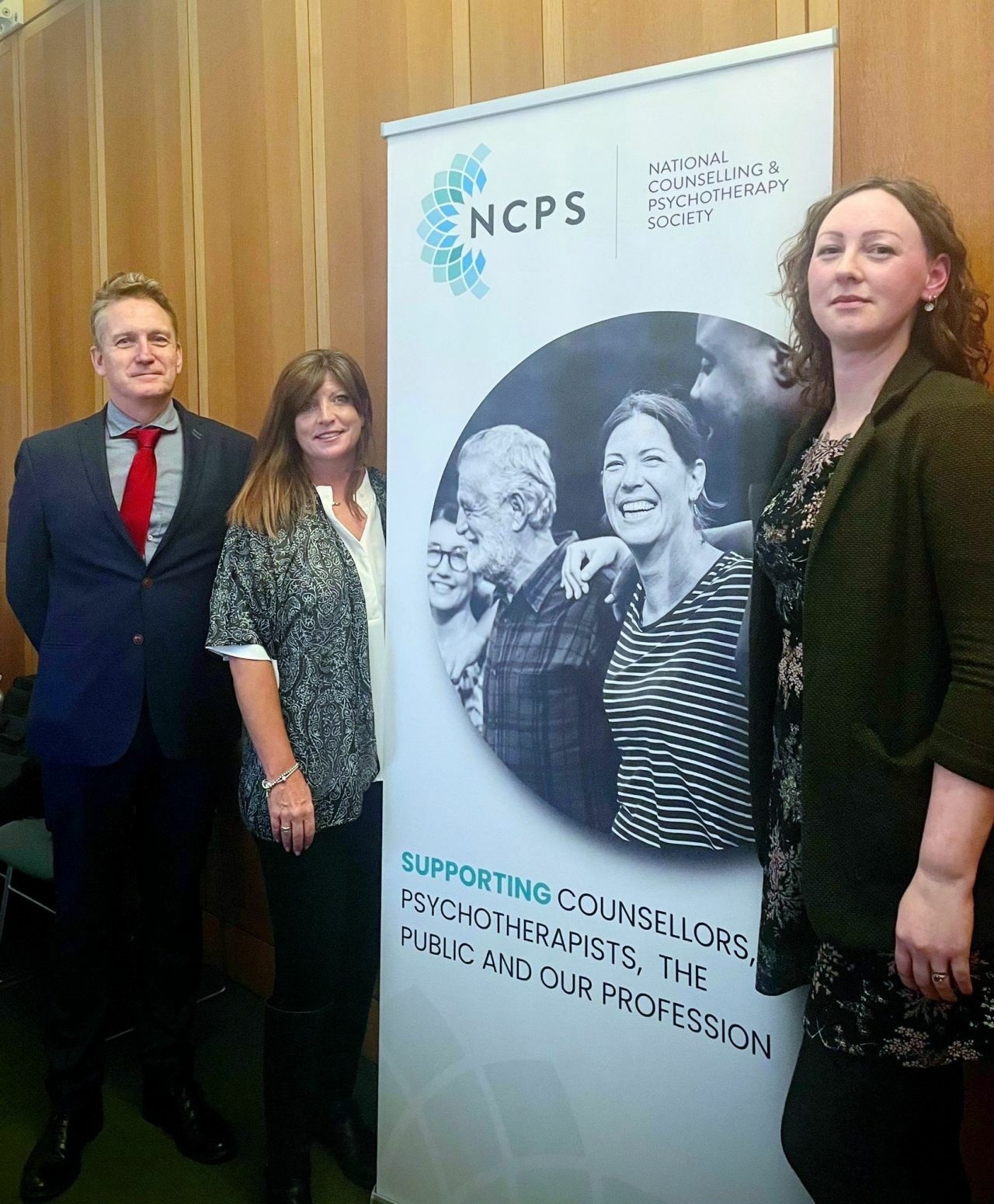
The event attracted diverse parliamentarians, including Sarah Champion MP (our host), Laura Kyrke-Smith MP (National Health Mission Champion), Sarah Hall MP, Preet Kaur Gill MP, and Baroness Healy of Primrose Hill – amongst many others. Discussions were lively and solutions-driven, with many requesting data for their own advocacy efforts. NCPS showcased how its practitioners, with an average wait time of just 1-2 weeks, can ease NHS pressures and provide swift support.
Beyond the event, the NCPS held 1:1 meetings with Jess Asato MP, Member of the Education Select Committee, to discuss embedding counselling services in schools and how to ensure every child has access to mental health support. We also met separately with Dr Danny Chambers MP, to discuss at greater length what the Liberal Democrats can do in opposition to support the NCPS’ message.
Besides engaging with political stakeholders, the NCPS also met with Connie Muttock, the Head of Policy at the Centre for Young Lives, a newly formed think-tank dedicated to improving the lives of children, young people, and families across the UK. With Connie, the team discussed how NCPS can collaborate on the impactful reports the think tank is due to publish, applying political pressure from all sides. The team also collaborated with the Centre for Research into the Education of Marginalised Children and Young Adults (CREMCYA) at the House of Lords to advocate for universal school counselling.
As a whole, NCPS’ stakeholder engagement efforts are shaping our advocacy trajectory, reinforcing our voice in mental health policy. With data-driven insights and strong political relationships, NCPS is readily poised to influence future reforms, ensuring counselling and psychotherapy remains integral to the nation’s mental health strategy.
Lookahead to Upcoming Activity
As NCPS continues to strengthen its advocacy efforts, we anticipate several key opportunities in the coming months. To begin, we are preparing for a meeting with Lord Kamall, Shadow Minister for Health and Social Care, to engage with opposition leaders and foster inclusive mental health strategies from all sides.
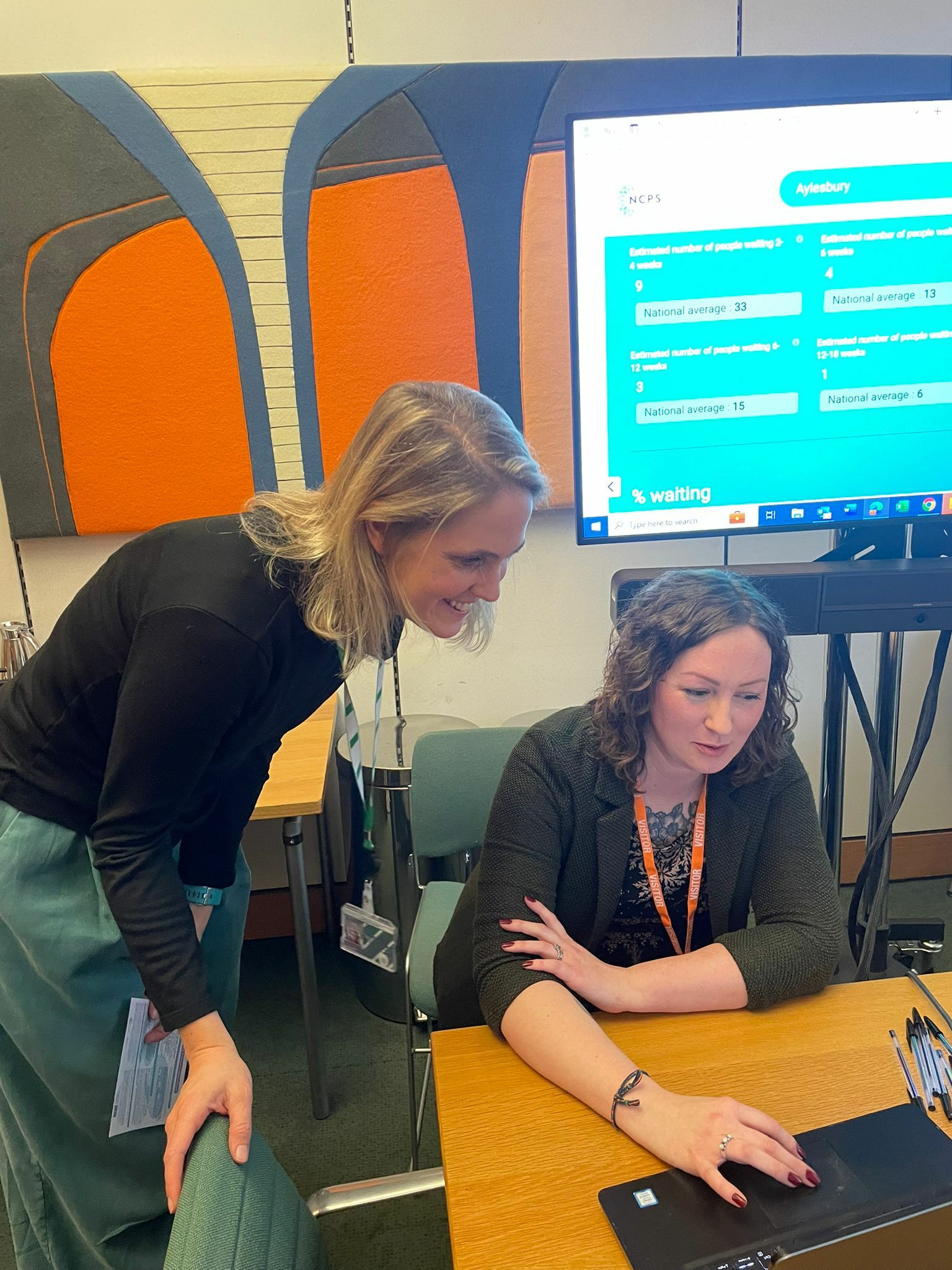
NCPS remains dedicated to active engagement across the devolved nations, ensuring its advocacy represents and supports members throughout the UK. In response to prolonged waiting times for psychological therapies in Scotland, NCPS is engaging with key Scottish stakeholders to advocate for integrating counsellors into the mental health system, improving access to patient-centred care. In Wales, NCPS remains an active participant in mental health discussions, including regular attendance at the Welsh Cross-Party Group on Mental Health and Eating Disorders. Building on positive engagement earlier in the year, NCPS is also strengthening its relationship with key stakeholders in the Northern Ireland Assembly, ensuring that its advocacy reflects the needs of members across all nations of the UK.
The refreshed NHS Workforce Plan, expected this summer, offers a crucial opportunity to advocate for counsellors and psychotherapists in workforce development strategies, ensuring well-staffed services. With the NHS 10-Year Plan due this spring, NCPS aims to see counsellors fully integrated into the NHS workforce, the therapeutic value of human connection prioritised over AI, and tailored mental health care accessible in all schools and primary care settings.
We look forward to collaborating with policymakers, healthcare leaders, and our members to ensure that forthcoming plans reflect the critical contributions of counsellors and psychotherapists in transforming mental health care.
If you'd like to learn more about our engagement activities or get involved, we'd love to hear from you. Please contact the team via our Head of Policy & Public Affairs, Meg Moss - meg@ncps.com.


